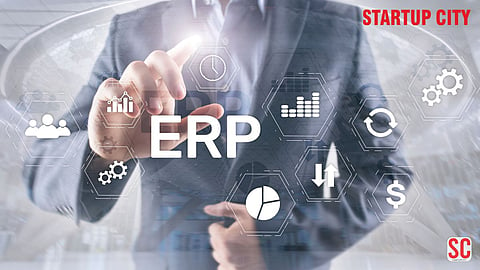

Enterprise Resource Planning (ERP) is a software system designed to help businesses manage their core operations, including finance, human resources, production, supply chain, and services. Essentially, ERP integrates all essential business functions into a unified system, enabling seamless data flow and efficient management.
At its core, ERP acts as a central record-keeping system, streamlining operations such as bookkeeping, finance, procurement, program management, and supply chain activities. This integration allows businesses to function effectively, even in the absence of key personnel.
ERP software, whether cloud-based or on-premises, provides a comprehensive platform that manages every aspect of a manufacturing or distribution firm. Beyond accounting, ERP facilitates financial management, supply chain coordination, human resources administration, and production planning.
By maintaining real-time visibility into business processes, ERP systems track production, logistics, and financial components, ensuring transparency across departments. These systems serve as the central hub for end-to-end workflows, making them essential for enterprises of all sizes, from small businesses to large corporations.
ERP is a software solution that automates and optimizes essential business processes. By standardizing data flow and centralizing information, ERP creates a single source of truth, eliminating inefficiencies and enabling smooth operations.
A robust ERP system integrates various departments, including finance, supply chain, operations, commerce, reporting, production, and human resources, into one platform. Many businesses already have financial and operational systems in place, but disconnected systems limit scalability and growth. As companies expand, they require adaptable ERP solutions to meet evolving demands.
SAP’s ERP software offers various modules covering financial management, order processing, human resources, and production. By centralizing these functions, SAP ensures seamless information sharing across departments, reducing errors and enhancing efficiency.
SAP ERP can be deployed both on-premises and in the cloud, making it a flexible solution for businesses with diverse needs. Features such as automation, data visualization, budgeting, and human resource management contribute to improved productivity and revenue generation.
SAP’s ERP systems integrate modules such as accounting, sales, manufacturing, and finance into a single database. This shared data structure ensures smooth information flow between modules, preventing redundant data entry while enforcing financial and procedural compliance.
The most widely implemented SAP system, SAP ERP Central Component (SAP ECC), is an on-premises software platform designed to support large-scale business operations.
ERP solutions play a crucial role in optimizing resource allocation, allowing businesses to reallocate financial and human capital efficiently. These systems enhance planning and coordination, providing employees with access to real-time inventory levels, customer orders, supplier purchase orders, and demand forecasts.
With ERP software, businesses can make data-driven decisions, reducing operational risks and enhancing overall efficiency. ERP systems also improve collaboration by enabling employees to view department-wide data, facilitating better coordination and decision-making.
Furthermore, ERP systems provide valuable analytics and reports, transforming vast amounts of data into actionable insights through charts and trend analysis. This capability helps executives make informed strategic decisions.
ERP software solutions come with various features to manage critical business functions such as human resources, accounting, customer relationship management (CRM), and supply chain management. Below are some notable ERP solutions:
A retail-focused ERP platform that automates order management, shipping, inventory tracking, and financial operations.
An industry-specific ERP solution for small businesses, integrating inventory management, sales, CRM, financials, analytics, and reporting.
A comprehensive ERP suite with functionalities such as risk management and expenditure tracking, designed by one of the world’s leading software corporations.
A flexible ERP solution offering modules for general business, distribution, manufacturing, construction, commerce, and field services.
An ERP solution tailored for small and medium-sized businesses in wholesale, retail, e-commerce, distribution, and manufacturing.
A powerful and versatile ERP system used by major enterprises such as Coca-Cola and BMW. It offers specialized applications for marketing, sales, customer service, finance, and operations.
For businesses looking to reduce costs while optimizing operations, free ERP solutions offer valuable features. Here are some notable options:
An open-source ERP solution with a 30-day free trial, offering a comprehensive range of business management features.
Free for up to 12 users, it provides project and task management, communication tools, and CRM functions.
A free, open-source ERP system offering CRM and supply chain management capabilities.
An open-source ERP and CRM solution with features such as sales management, HR, inventory tracking, and billing.
A free ERP platform providing e-commerce, production management, supply chain management, and CRM functionalities.
To maximize the benefits of an ERP system, businesses must follow these best practices:
Before implementing ERP, analyze existing workflows to identify areas needing improvement. This assessment helps tailor the ERP system to the company’s needs.
Proper training ensures employees can efficiently utilize the ERP system. Ongoing training programs help users adapt to software updates and changes.
High-quality data is essential for effective ERP use. Standardizing data entry and conducting regular audits prevent errors and inconsistencies.
ERP systems offer customization options to align with business needs. Companies can optimize fields, toggle features, and integrate plugins to enhance usability.
ERP systems evolve over time. Businesses should stay informed about future updates and technological advancements to ensure their ERP remains relevant.
Integrating ERP with manufacturing, CRM, supply chain management, and warehouse management systems (WMS) enhances overall operational efficiency.
Modern ERP solutions offer mobile apps for increased accessibility. Employees can access real-time data remotely, improving productivity and decision-making.
ERP software plays a vital role in modern business operations by integrating key processes into a unified system. Whether a company chooses an on-premises or cloud-based solution, ERP enhances efficiency, data accuracy, and decision-making capabilities. With numerous options available, businesses can select an ERP system that best meets their specific needs and growth objectives.